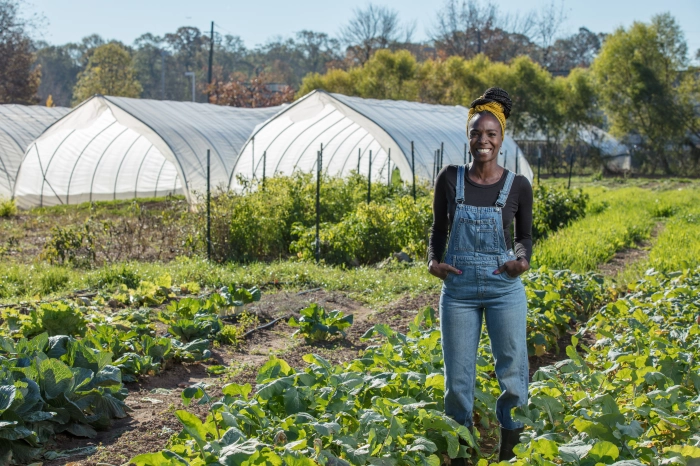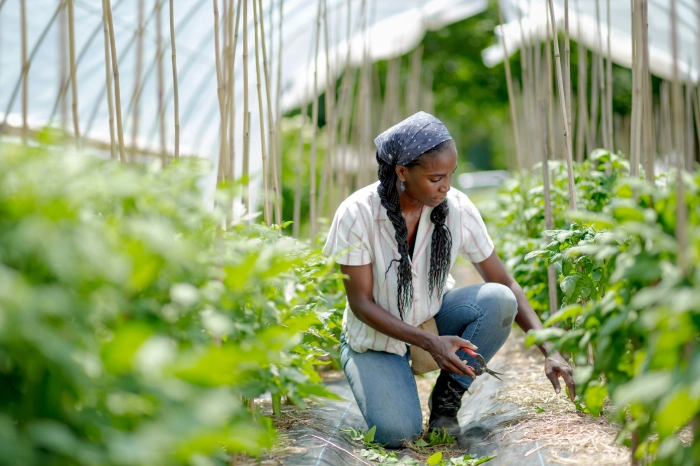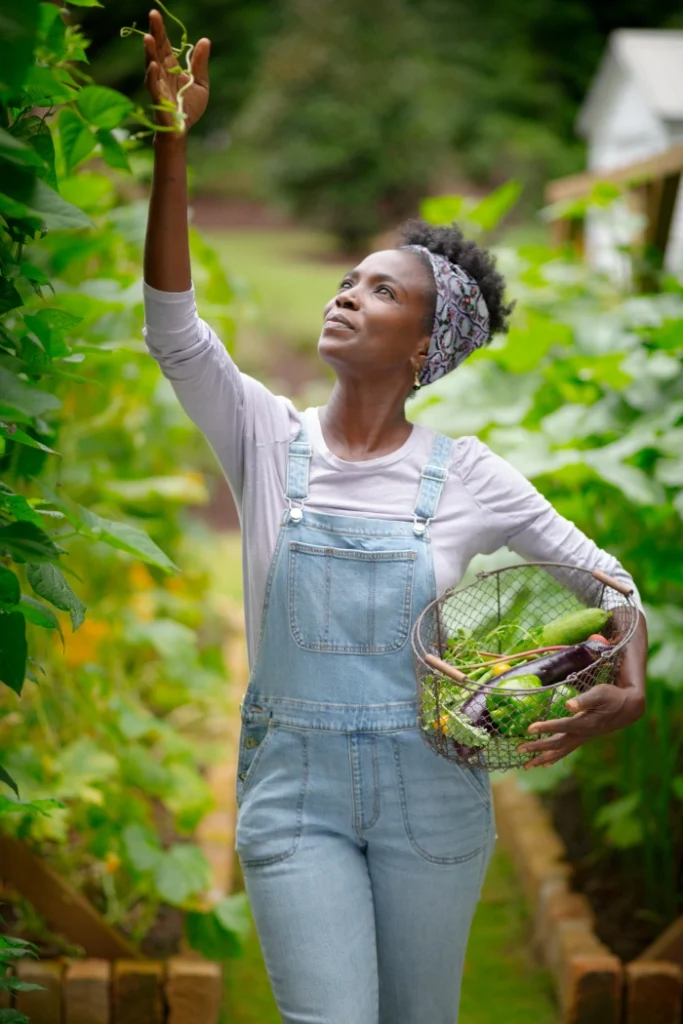
The ‘Homegrown’ actress discusses food sovereignty and drawing inspiration from her family’s farm in Jamaica.
By Nylah Burton @yumcoconutmilk
Jamila Norman is the host of Homegrown, a Magnolia Network show in which she assists families in starting their own gardens for food. She hopes that the urban farming lessons she teaches will have an impact on the surrounding community. Norman, an environmental engineer by trade, began Patchwork City Farms in Atlanta with her business partner, Chef Beee, in 2010.
She became an environmental engineer because she wanted to solve problems with sustainability and climate change, and farming is no exception. “Atlanta has very poor air quality. So having that lush greenery contributes to better air quality. Farming in the city also allowed us to divert a lot of wood chips and compost that would otherwise have ended up in landfills.”
“Farming wasn’t just about addressing one issue,” the speaker claimed. “It was about creating an ecosystem of health and wellness.” On the Jamaican estate where Norman’s great-grandfather raised bulls and her great-grandmother produced coconut oil, Norman’s father, who is from Trinidad, was raised. “I have respect for the earth-based lifestyle led by my great-grandparents.
“Access to fresh food was one of the issues I encountered in the Atlanta community where I moved. Fresh food was almost non-existent. “There was a lot of fast food and corner stores,” Norman said. “I saw an opportunity to take an unused city space and use it to grow food in a green and sustainable way.”
Patchwork City Farms is located on 1.2 acres in Atlanta, and when Norman and Chef Beee first opened the doors in 2010, they leased the land from a local public school. However, both owning the land on which she farmed and making a profit were critical. Black people in the African diaspora have a long and rich relationship with agriculture. Nonetheless, it is a relationship marked by Europeans forcing us to work the land as enslaved people, stealing the profits of our sweat as sharecroppers, and depriving us of nutrients as many of us are pushed into food deserts.
The farm owned by African-Americans is also in grave danger. Over the last century, the number of Black-owned farms fell from around 925,000 in 1920 to 35,000 between 2012 and 2017, a 96% decrease. Norman demonstrates how agriculture can be a profitable business for Black people and encourages others to farm, all while highlighting the history — and present — of Black farmers. “I am not the first or the last,” she stated. “I don’t mind being visible, but I will always acknowledge and celebrate the fact that this is a lineage of work that we’ve been doing for centuries.”
We spoke with Norman about how gardens can empower communities, the history of Black farmers, and how her great-grandparents’ commitment to food sovereignty has influenced her.
The length and clarity of this interview have been edited.

What are some of your favorite times when you made people feel empowered to start their own farm or garden, and how did that impact their community or lives?
Right now, I’m working with the West Atlanta Watershed Alliance. This is a Black-led environmental conservation organisation. We’ve been using the food we grow there to do community-wide mutual aid distributions of fresh produce. Fresh produce is delivered weekly to seniors in the community. It would be wonderful if they could participate in the garden, but mobility is an issue, so we’re growing and delivering it directly to them.
And student gardens are a lot of fun because the kids get so excited about fresh fruits and vegetables after working in the garden. Seeing something grow from a small seed is very hands-on and tactile for them. It’s as if they’re digging up a secret that they can eat.
It also allows them to tap into family knowledge, such as “Oh, my God, my grandma kept a garden, and she would be so proud of me for doing this.”
What effect does family knowledge have on your farming and gardening?
My great-grandmother lived to the age of 103. I met my great-grandfather as well, but I was much younger. My mother told me the stories I know about them. My great-grandparents raised her until she was about 16 years old, when she came to New York to see her mother.
My great-grandparents believed that they could get everything they needed – their sustenance – from the land. They raised chickens, but her main product was coconut oil. That’s what my great-grandmother brought to market with her fruits and vegetables. During mango season, she would also travel around Jamaica, bringing mangoes to market. That was the life that enabled her to support ten children.
And she raised many of her grandchildren as her children emigrated to make a better life for themselves overseas, only to be reunited with their children after they had settled down.

That is an important lesson for us to remember now, as the climate crisis becomes more catastrophic. Is concentrating on food sustainability making you feel less powerless?
It is not a personal issue. Individuals must, however, take part in addressing the issue. These are not new issues, either. Because these issues existed at the time, I became interested in environmental engineering in 1997. And they existed before that. My work has inspired many others to return to the land and steward it in sustainable and beneficial ways. When you manage land in a sustainable manner, you help to address the climate crisis. Agriculture is such a broad field, but it also has a significant environmental impact. If we can get more people to transition to a more sustainable way of farming, it will have an impact on food, forestry, and clothing.
What is your favorite place you’ve visited, and what did you learn about their food culture?
When I travel, I look for food and farming culture. I can’t seem to get away from it. Zanzibar, Tanzania, is my favourite place I’ve visited. The country is tropical, which reminds me of my Caribbean roots. They grow many of the foods I am familiar with, as well as many others. The cuisine is incredible, combining African, Persian, and Indian traditions. Zanzibar has a long history of thriving spice trade, which is reflected in its food culture.
How have you felt your impact as a Black woman visible in farming, a field in which we have always been present but have had little positive representation?
I’m not the type of girl who enjoys being in front of the camera. It defies belief that I’m doing this at all. But I accepted the network opportunity because the visibility my business partner, Chef Beee, and I had meant people were drawn to the work of urban farming. They hadn’t seen themselves doing this work before, so they were astounded, thinking, ‘Wow, this is possible?’ I wanted a platform to inspire and educate people about urban farming and gardening. I don’t take it lightly that I am visible in a role that is not expected of women and has not previously been celebrated.

People try to make me out to be the first or to do something radical. However, there are Black women in Atlanta who have been farming for decades. They inspire me. The race to be the “first” Black person to do something in the food industry drives me insane.
It contributes to the false notion that Black people haven’t accomplished much in this country. To say, ‘I come from a lineage of people who have done this, who know how to do this,’ enriches the work you’re doing for me. I’m just carrying the torch,’ rather than claiming to be the first. I understand why people do it and what they want, but I constantly challenge them to unpack it. You don’t have to deny history in order to better yourself. ‘Ain’t nothing new under the sun,’ my father says all day.
I notice you use the word “stewarding.” What does it mean to be a steward of the land?
I’m using the word stewarding on purpose because we’re only here for a short time. Despite the fact that there is a concept of land ownership, you do not own the land. You have the right to access it and make a home for yourself.
But the land has always existed and will continue to exist. I’m just here stewarding it — working on it and doing my best to treat the land and nature with respect. Ownership and control are fluid concepts. I support the Land Back movement, which seeks to return land to Native Americans in whatever form that may take. The land is just something I’m stewarding for the time being, and I hope that after I’m gone, someone else will steward it in the same or better way.
Nylah Burton is a travel, lifestyle, and entertainment writer whose work has appeared in New York Magazine, Vogue, and Travel + Leisure.